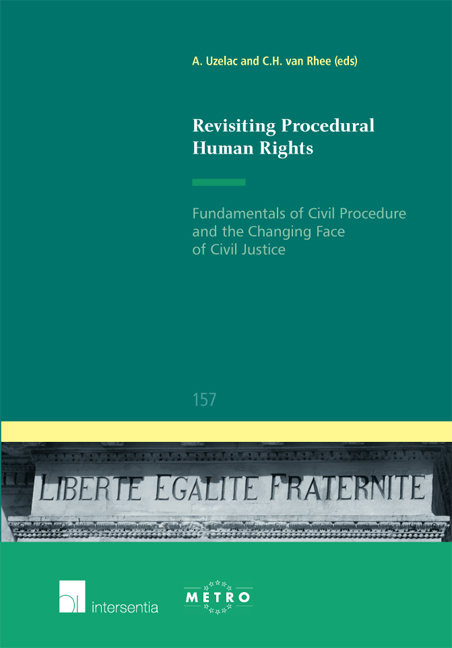 Revisiting Procedural Human Rights
Revisiting Procedural Human Rights Book contents
- Frontmatter
- Table of Contents
- List of Authors
- List of Abbreviations
- Acknowledgements
- Introduction
- The Human Right to Accessible and Foreseeable Justice
- Fundamental Procedural Rights from a National Angle
- Wheels of History: Fair Trial Rights in Historical Perspective
- Access to Justice by Means of Arbitration in Roman Law
- Civil Procedural Aspects of Retroactivity – Historical and Comparative Perspectives
- Equal Justice for all: Empirical and Normative Approaches to Legal Aid and Assistance in Civil and Administrative Cases
- Ius Commune Europaeum
Access to Justice by Means of Arbitration in Roman Law
from Wheels of History: Fair Trial Rights in Historical Perspective
Published online by Cambridge University Press: 13 October 2018
- Frontmatter
- Table of Contents
- List of Authors
- List of Abbreviations
- Acknowledgements
- Introduction
- The Human Right to Accessible and Foreseeable Justice
- Fundamental Procedural Rights from a National Angle
- Wheels of History: Fair Trial Rights in Historical Perspective
- Access to Justice by Means of Arbitration in Roman Law
- Civil Procedural Aspects of Retroactivity – Historical and Comparative Perspectives
- Equal Justice for all: Empirical and Normative Approaches to Legal Aid and Assistance in Civil and Administrative Cases
- Ius Commune Europaeum
Summary
Introduction
The evolution of Roman law and the continuous changes in legal institutions were reflected in the field of dispute resolution. The legal changes that substantially affected dispute resolution occurred in a specific way. The overall changes to the existing paradigm of civil procedure and dispute resolution did not happen all at once. These events were rare and always represented the final result of a slow and long-lasting historical process which was deeply affected by social changes. If they are carefully observed, all major ‘revolutions’ in Roman civil procedure can be described as attempts to facilitate access to justice and increase the number of people entitled to seek judicial protection.
At least in theory, the publication of the Law of Twelve Tables (of which the initial three tables exclusively regulate civil procedure) made civil litigation known and in some forms accessible to a larger number of Roman citizens.
Livy reports that the praetor urbanus was created to hear cases of law in Rome, which means that his primary function was to improve civil justice by making it accessible to the people who lived in the city of Rome. According to Pomponius, the creation of the praetor inter peregrinos, who mainly exercised his jurisdiction as between non-citizens, was motivated by the insufficiency of having a single praetor urbanus. The introduction of the praetor peregrinus was the result of the great number of foreigners (peregrini) who were territorially incorporated into the Roman state.
The introduction of the procedure per formulas, which subsequently meant abandonment of a rigid and at the time anachronistic legis actio procedure, supported an easier access to justice whose use was made available to the majority of the Roman population. The procedure per formulas was not bound by the traditional constraints of civil litigation which existed in the system of legis actiones. E. Metzger states that ‘it improved the system of pleading because litigants were no longer required to plead the words of civil law. They were now allowed to plead an event which triggered the assistance of the law, and the law could be either civil or praetorian in origin.’
- Type
- Chapter
- Information
- Revisiting Procedural Human RightsFundamentals of Civil Procedure and the Changing Face of Civil Justice, pp. 243 - 262Publisher: IntersentiaPrint publication year: 2017


